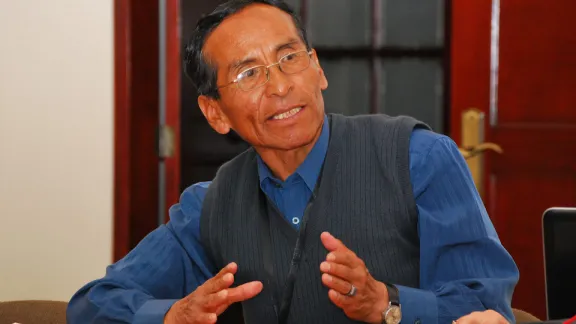
Dr Emilio Mendoza Apaza shares about the development of the Bolivian Evangelical Lutheran Churchâs (IELB) HIV and AIDS ministry. © IELCO/L. E. Ramirez
Quest for Dignity, Justice an Expression of God’s Unconditional Love
The Lutheran World Federation (LWF) member churches in Latin America and the Caribbean have launched an HIV and AIDS network in the region utilizing biblical analysis to affirm this prophetic ministry.
“When a part of the body of Christ suffers, the whole body suffers. In a well-connected and held body, the parts help each other,” was the motto of the LWF meeting held in Bogota, Colombia, 11-12 August as a follow-up on recommendations from the region’s 2012 church leadership conference.
Rev. Rocio Morales of the Evangelical Lutheran Church of Colombia invited participants to analyze the Scriptures through the lenses of healing and liberation.
“The Lutheran churches in Latin America and the Caribbean cannot continue allowing people living with HIV and AIDS to be treated as objects. We must become conscious that they are subjects of history and part of the body of Christ. They should seek their identities in a free, welcoming, and healthy society,” said Morales.
Rev. Dr Patricia Cuyatti, area secretary for Latin America and the Caribbean in the LWF Department for Mission and Development (DMD), said the network was launched after the churches had reflected on the different dimensions of what it means to be part of the body of Christ.
After analyzing their HIV and AIDS ministries, some of the churches in the region redefined and structured their work while others are seeking empowerment in order to preach, serve, and advocate for the rights of all persons.
During the consultation “Transformed to Transform,” held in June 2010 in Lima, Peru, the LWF member churches became aware of the need for mutual enrichment in order to strengthen their work.
The network “is an opportunity to enrich capacity in the region in order to accompany persons and families living with HIV and AIDS, to build awareness, and advocate for justice,” affirmed Bishop Eduardo Martinez of the Evangelical Lutheran Church of Colombia.
The network is the result of long and diverse experiences and ministries of the member churches.
“We are committed to developing God’s mission promoting equal participation through dynamic relationships. For this purpose, the network will be facilitated in a collegial manner,” added Ros Mary Rincón from the Evangelical Lutheran Church of Colombia, one of the network facilitators.
The coordination team, which also comprises Rev. Kenneth Kross, Evangelical Lutheran Church in Suriname; Rogério Oliveira de Aguiar, Evangelical Church of the Lutheran Confession in Brazil; and Rev. Concepción Angel Venegas, Salvadoran Lutheran Church, is committed to promoting interaction among churches through various means of communication in order to support and strengthen the communion in the region as its members approach the commemoration of the 500th anniversary of the Lutheran Reformation in 2017.
The network hopes that by 2017 the LWF member churches in Latin America and the Caribbean – each in its own context – are committed to seek dignity and justice for persons living with or affected by HIV and AIDS as an expression of the unconditional love of God.
“Considering the fact that stigma and discrimination regarding HIV and AIDS persist, the member churches are potential spaces to continue witnessing to God’s grace in a comprehensive manner,” said Cuyatti.
“The LWF will continue to facilitate member churches’ participation and engagement in responding to HIV and AIDS, particularly as they concern stigma and marginalization,” noted Rev. Dr Panti Filibus Musa, DMD director. (576 words)
Luis Eduardo Ramirez, Evangelical Lutheran Church of Colombia, and David Heffel Cela, Evangelical Church of the River Plate (Argentina), contributed to this article.


